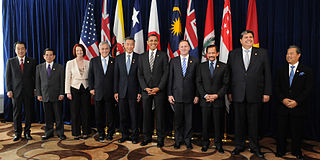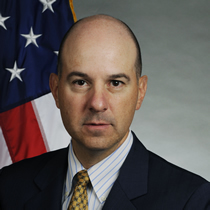
The Office of the United States Trade Representative (USTR) is an agency of the United States federal government responsible for developing and promoting American trade policy. Part of the Executive Office of the President, it is headed by the U.S. Trade Representative, a Cabinet-level position that serves as the U.S. President's primary advisor, negotiator, and spokesperson on trade matters. USTR has more than two hundred employees, with offices in Geneva, Switzerland, and Brussels, Belgium.

Ronald Kirk is an American lawyer and politician who served as the United States Trade Representative from 2009 to 2013, as the 97th Secretary of State of Texas, and as the 57th Mayor of Dallas from 1995 to 2002. He is a member of the Democratic Party.

Robert Walker Holleyman II served as the United States Deputy Trade Representative, with the rank of ambassador, in the Office of the United States Trade Representative in September, 2014 to January 2017. Previously he was the President & CEO of the Business Software Alliance (BSA), the trade consortium which represents the interests of major software houses globally.

The Trans-Pacific Partnership (TPP), or Trans-Pacific Partnership Agreement, was a highly contested proposed trade agreement between 12 Pacific Rim economies: Australia, Brunei, Canada, Chile, Japan, Malaysia, Mexico, New Zealand, Peru, Singapore, Vietnam, and the United States. The proposal was signed on 4 February 2016 but not ratified, being opposed by many Democrats and Republicans, including both major-party presidential nominees, Donald Trump and Hillary Clinton. After taking office, the newly elected President Donald Trump formally withdrew the United States from TPP in January 2017, therefore the TPP could not be ratified as required and did not enter into force. The remaining countries negotiated a new trade agreement called Comprehensive and Progressive Agreement for Trans-Pacific Partnership, which incorporates most of the provisions of the TPP and which entered into force on 30 December 2018.

The Trade Act of 1974 was passed to help industry in the United States become more competitive or phase workers into other industries or occupations.
Section 301 of the U.S. Trade Act of 1974 authorizes the President to take all appropriate action, including tariff-based and non-tariff-based retaliation, to obtain the removal of any act, policy, or practice of a foreign government that violates an international trade agreement or is unjustified, unreasonable, or discriminatory, and that burdens or restricts U.S. commerce. Section 301 cases can be self-initiated by the United States Trade Representative (USTR) or as the result of a petition filed by a firm or industry group. If USTR initiates a Section 301 investigation, it must seek to negotiate a settlement with the foreign country in the form of compensation or elimination of the trade barrier. For cases involving trade agreements, the USTR is required to request formal dispute proceedings as provided by the trade agreements. The law does not require that the U.S. government wait until it receives authorization from the World Trade Organization (WTO) to take enforcement actions, and the President is increasingly focused on enforcing intellectual property (IP) rights under the "Special" 301 amendments but the U.S. has committed itself to pursuing the resolution of disputes under WTO agreements through the WTO dispute settlement mechanism, which has its own timetable.

Christine A. Varney is an American antitrust attorney who served as the U.S. assistant attorney general of the Antitrust Division for the Obama Administration and as a Federal Trade commissioner in the Clinton Administration. Since August 2011, Varney has been a partner of the New York law firm Cravath, Swaine & Moore, where she chairs the antitrust department.
The Patent Reform Act of 2007 was a bill introduced in the 110th United States Congress to introduce changes in United States patent law. Democratic Congressman Howard Berman introduced the House of Representatives bill on April 18, 2007. Democratic Party Senator Patrick Leahy introduced the Senate bill on April 18, 2007. The bill passed the house but died in the Senate.

The Software Alliance, also known as BSA, is a trade group of business software companies established in 1998. Its principal activity is trying to stop copyright infringement of software produced by its members. It is a member of the International Intellectual Property Alliance. Founded as the Business Software Alliance, it dropped "Business" from its name in October 2012, and styles itself "BSA | The Software Alliance".
The Prioritizing Resources and Organization for Intellectual Property Act of 2008 is a United States law that increases both civil and criminal penalties for trademark, patent and copyright infringement. The law also establishes a new executive branch office, the Office of the United States Intellectual Property Enforcement Representative (USIPER).

David "Dave" J. Kappos is an attorney and former government official who served as Under Secretary of Commerce for Intellectual Property and Director of the United States Patent and Trademark Office (USPTO) from 2009 to 2013. Kappos is currently a partner at New York law firm Cravath, Swaine & Moore.

The Chief Agricultural Negotiator is an ambassador of the Office of the United States Trade Representative (USTR) responsible for conducting and overseeing international negotiations related to trade in agricultural products. The Chief Agricultural Negotiator is compensated at the rate payable for Level III of the Executive Schedule.

The Special 301 Report is prepared annually by the Office of the United States Trade Representative (USTR) that identifies trade barriers to United States companies and products due to the intellectual property laws, such as copyright, patents and trademarks, in other countries. By April 30 of each year, the USTR must identify countries which do not provide "adequate and effective" protection of intellectual property rights or "fair and equitable market access to United States persons that rely upon intellectual property rights".

The PROTECT IP Act was a proposed law with the stated goal of giving the US government and copyright holders additional tools to curb access to "rogue websites dedicated to the sale of infringing or counterfeit goods", especially those registered outside the U.S. The bill was introduced on May 12, 2011, by Senator Patrick Leahy (D-VT) and 11 bipartisan co-sponsors. The Congressional Budget Office estimated that implementation of the bill would cost the federal government $47 million through 2016, to cover enforcement costs and the hiring and training of 22 new special agents and 26 support staff. The Senate Judiciary Committee passed the bill, but Senator Ron Wyden (D-OR) placed a hold on it.

The Stop Online Piracy Act (SOPA) was a controversial proposed United States congressional bill to expand the ability of U.S. law enforcement to combat online copyright infringement and online trafficking in counterfeit goods. Introduced on October 26, 2011, by Representative Lamar Smith (R-TX), provisions included the requesting of court orders to bar advertising networks and payment facilities from conducting business with infringing websites, and web search engines from linking to the websites, and court orders requiring Internet service providers to block access to the websites. The proposed law would have expanded existing criminal laws to include unauthorized streaming of copyrighted content, imposing a maximum penalty of five years in prison.

The Online Protection and Enforcement of Digital Trade Act is a bill introduced in the United States Congress proposed as an alternative to the Stop Online Piracy Act and PROTECT IP Act, by Senator Ron Wyden of Oregon, a Democrat, and Representative Darrell Issa of California, a Republican. The text of the bill is available for public comment at keepthewebopen.com.
The Copyright Alliance is a nonprofit, nonpartisan 501(c)(4) organization representing artistic creators across a broad range of copyright disciplines.

Michelle Kwok Lee, born 1965 in Santa Clara, California, was vice president of Amazon Web Services and a former Under Secretary of Commerce for Intellectual Property and Director of the United States Patent and Trademark Office (USPTO).

Jennifer Choe-Groves is an American lawyer and jurist who serves as a United States Judge of the United States Court of International Trade.

Vishal Amin is an American attorney and government official who served as Intellectual Property Enforcement Coordinator. This position, sometimes referred to as "IP czar", was created by an act of Congress in 2008 in order to help the U.S. government combat online piracy. Prior to assuming his current role, Amin was senior counsel on the House Judiciary Committee.













